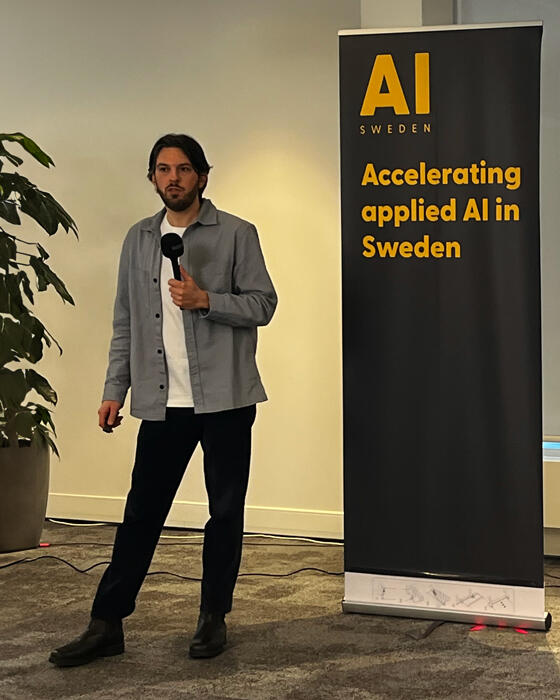Significant new initiatives to propel Sweden's AI development
AI Sweden and its partners are launching two groundbreaking AI initiatives that will be pivotal for Sweden's competitive edge and the ability to deliver high-quality societal services. These initiatives will also strengthen Sweden’s capabilities in AI and digital sovereignty.
AI Sweden has recently made the first major language model for Nordic languages, GPT-SW3, freely available as an open resource. Now, two new important steps are being taken to advance both Swedish development and Swedish usage of large language models.
The first initiative focuses on developing the first major multimodal language model in and for Sweden. This follows international trends in AI. The model will have a broad ability to solve a variety of tasks, including interaction with external tools such as databases and web browsers. It will also be able to process and generate images and audio. Like GPT-SW3, this new model will serve as a new national resource for Sweden.
Since we started working on GPT-SW3, the frontline has shifted from pure language models to those that also handle sound and image. For Sweden’s digital sovereignty, it is crucial to have our own expertise and technology because it gives us control over training data and governance over the technology. By starting to train these models now, we ensure we are at the forefront of technological development
Magnus Sahlgren, Head of NLU på AI Sweden
In parallel, AI Sweden is collaborating with partners to create a shared digital assistant for the public sector. This assistant will be developed by fine-tuning a large language model—like GPT-SW3—with data generated by employees in public organizations. Similar to ChatGPT but tailored for Swedish public service needs and developed with our democratic values, norms, and societal diversity in mind; all while securely managing input data. The use and evolution of this assistant represent a novel approach within the public sector that will foster continuous improvement and adaptation through each employee's contributions directly shaping a more intelligent and efficient digital assistant.
By supporting employees in their text-based tasks, this assistant aims to simplify everyday work for public servants allowing them time for more interpersonal value-added tasks. It is designed to be user-friendly and accessible to all employees regardless of their tech skills, capable of tasks such as:
- Summarizing large bodies of text.
- Enhancing text clarity.
- Generating documents like reports or applications according to specific templates.
- Classifying documents for decision-making processes.
- Providing personalized support for citizens.
Sweden faces significant challenges within welfare services. The public sector needs modern tools where AI can maximize impact quality-wise. Many organizations are too small to build such resources alone while larger ones depend on smaller entities for sufficient data volumes required for truly capable AI products. This digital assistant is a unique solution that strengthens Sweden’s ability to harness AI power through national collaboration.
Jonatan Permert, AI-transformationsstrateg, AI Sweden

These initiatives strengthens Sweden's position in terms of digital sovereignty and AI capabilities by developing expertise around large language models while making advanced AI resources widely accessible. They should be viewed as modern infrastructure where central entities coordinate development resources or services beyond individual actors' capacity or means alone.
It’s always inspiring to hear about exciting AI initiatives from different actors. When used correctly, AI can lead to increased innovation, strengthened competitiveness, better welfare, and a more efficient public administration
Minister of Public Administration, Erik Slottner
The Future's Digital Assistant for the Public Sector
The project's goal is to develop an AI-powered digital assistant designed to support public sector employees with a variety of text-related tasks.
This assistant will be built on a Swedish language model and trained using instructional data provided by the employees themselves.
The development is structured in multiple phases:
- The first phase, which is currently being financed by Vinnova and its partners, will run until the summer of 2024. Participants from the public sector include Kungsbacka Municipality, Tjörn Municipality, Gothenburg City, Region Skåne, Region Halland, and Västra Götaland Region. Intel is partnering as the hardware provider for the necessary technology.
- In phase two, expected to extend until the end of 2025/2026, we anticipate a significant increase in participating municipalities and regions.
- By 2026, the ambition is for the digital assistant to be fully operational for long-term deployment.
Multimodal Language Model
AI Sweden is progressing from its initial large-scale Nordic language model GPT-SW3 towards creating a comprehensive multimodal model capable of processing not just text but also images and audio.
- The goal is to create a family of models with the largest one boasting at least 100 billion parameters.
- All models developed within this project are intended to be open-source; meaning they can be downloaded freely and are available for modification, fine-tuning, research, and commercialization.
The development roadmap consists of multiple phases:
- The first phase (financed by Vinnova) will continue until summer 2024 and includes data collection for training purposes.
- Phase two is targeted for completion by the end of 2024. During this period, extensive training of the new model will take place.
For more information, contact



